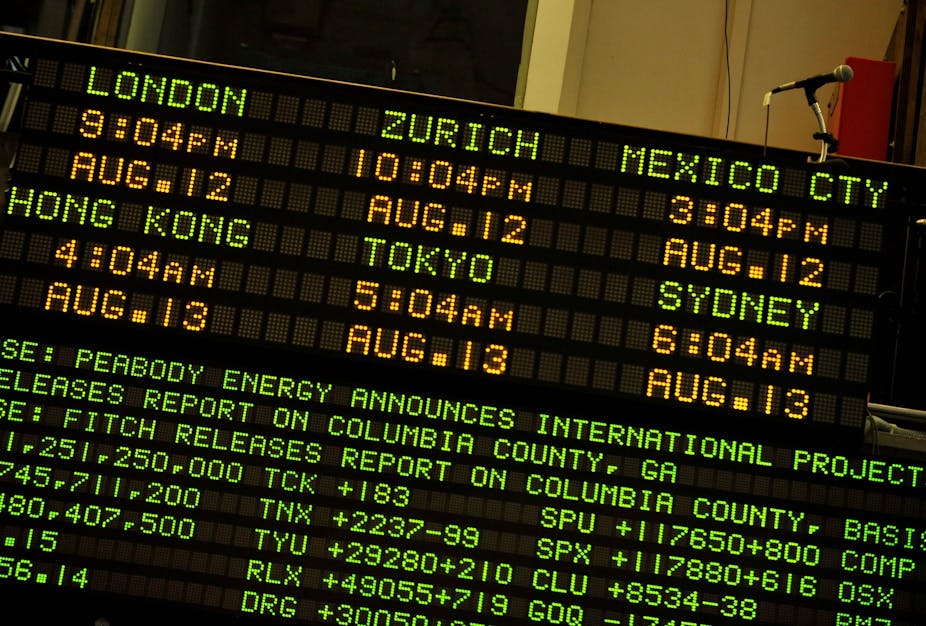The stock market has taken us on a wild ride in recent times.
Some, such as BHP Chairman Jac Nasser and Victorian Premier Ted Baillieu, have suggested that in light of the ongoing economic uncertainty we should delay the implementation of the proposed carbon pricing package.
To do so would be short-sighted.
The case for delay is that the carbon price could increase business uncertainty and undermine the economy at a time when it is already vulnerable.
We have been here before. The Rudd government delayed its carbon pricing scheme due to the global financial crisis in 2009.
The current international economic environment is uncertain.
But Australia’s carbon price is not due until July 2012. The economic weather may well be less stormy by then.
And the economic news is not all bad. Australia’s unemployment rate is 5.1%, our region is booming, and our terms of trade are strong.
Carbon price reforms aren’t uncertain
The Government’s scheme commences with a fixed price. From 2015, a price ceiling and floor will ensure that the carbon price operates within a specified range.
As a result, business knows what the carbon price will be for the next few years, and can plan appropriately.
Dragging out the implementation of the carbon price will only increase, not assuage, uncertainty.
This is particularly so for the electricity sector. We need investment in new electricity generating capacity. Mothballing the carbon price will make it more difficult for investors to decide what type of capacity to invest in.
2020 will come quickly
There are other reasons why delaying carbon pricing does not make sense.
Australia has an international commitment to reduce our emissions by 5% of 2000 levels by 2020. The commitment was made under the Copenhagen Accord.
2020 is actually very soon, and the required reduction in emissions is sizeable. The only realistic way we can get close to meeting our commitment is to get started with carbon pricing now.
Failing to meet our 2020 commitment would significantly undermine our contribution to the international effort to reduce climate change risks.
A long-term transition
The point of carbon pricing is to ease our way into a low-carbon development path.
Relative to many of the shocks that buffet our economy, moving to carbon pricing is likely to be a smooth transition that goes unnoticed by many.
Economic models indicate that we will continue to get richer with a carbon price.
Models also indicate that the eventual costs of reducing our emissions will be lower if we commence the journey sooner rather than later.
Bring on the income tax reductions
One of the good things about a carbon price is that it raises money which can be used to reduce other taxes.
The government’s Clean Energy Plan includes income tax reductions exceeding $3bn next financial year.
Ideally, an even greater share of the carbon price revenue will be directed to reducing tax rates in the future.
The new income tax scales won’t see a reduction of marginal tax rates for most working Australians. But the increase in the tax-free threshold will increase the incentive for low-income earners to work.
Any delay in carbon pricing would also be a delay of these income tax cuts.
Some sectors will benefit from carbon pricing
The likely benefits of carbon pricing for low-carbon businesses are often overlooked.
Carbon pricing will reduce the relative price of low-carbon goods, and so encourage their consumption.
The clean energy sector will clearly benefit from the reforms.
Other low-carbon businesses far removed from energy may also benefit as consumers substitute toward their products. Many of these businesses may not even know that they are likely beneficiaries of carbon pricing.
Their voices are not often heard in the debate.
Good governance requires a cool head
A pilot who forgets to navigate due to short-term turbulence would end up at the wrong destination.
If governments reacted to every piece of negative news by neglecting their long-term reform agenda, the quality of our overall governance would be substantially weakened.
The climate won’t wait for the financial markets.
Carbon pricing was a good idea before the recent economic events, and remains a good idea now.

